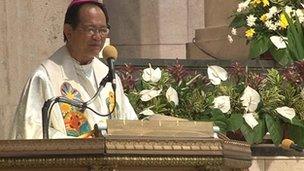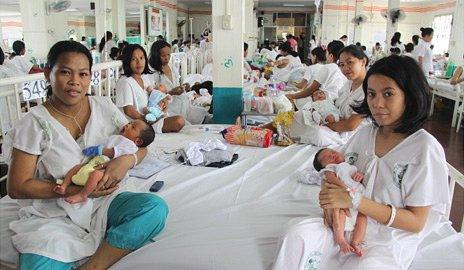Fierce debate over Philippine contraception bill
- Published
Nurse Christina shows the conditions at Jose Fabella Hospital in Manila
In one of Manila's sprawling slums, Clarita is busy making lunch for her family.
She has 10 children and making sure they do not go hungry is a daily struggle.
Down a narrow alleyway another desperately poor woman has eight children. Another woman just round the corner has nine.
It is hardly surprising then that the Philippines has the highest birth rate in South East Asia. In 1990 there were 60 million Filipinos. Now there are more than 95 million.
Like her neighbours and more than 80% of the population, Clarita is a Catholic.
She regularly attends church and has a picture of Jesus Christ and a bible verse taped on to the wall of the one small room in which the family live.
But recently she has begun to think that, on one matter at least, the Church is wrong.
"I used to believe in the Church's teachings about having lots of children," she says.
"But now I really think we should have family planning."
'Happily out of step'
In theory, it is easy to get contraception in the Philippines. You can buy the female pill over the counter at any pharmacy and virtually every corner shop sells condoms.
But for someone like Clarita, these options are far too expensive. A packet of condoms would cost her almost as much as her weekly food bill.

Bishop Teodoro Bacani says the government should not be promoting family planning
That is why the government has put forward a reproductive health bill that includes a provision to give out free contraception and family planning advice to couples that want it.
But the bill is facing fierce opposition from the Church.
"It's not the business of government to be promoting contraceptive devices," says Bishop Teodoro Bacani.
"It's like the government saying it will pass a law which will fund the promotion of pork-eating among the Muslims. Can you imagine what an uproar there would be among the Muslim population?"
While many Catholic countries are debating whether to allow abortion, that issue is not under discussion here. Everyone in this debate knows that a bill to legalise abortion would have little support.
This is purely about contraception, which according to many senior bishops is almost as bad as abortion anyway, because anything that prevents a sperm meeting an egg prevents a potential birth.
Bishop Bacani said he realised the Philippines was out of step with the rest of the world, saying: "We are… and happily so."
This is not a belief that is confined to the clergy. Many senior members of society - politicians, media commentators, businessmen - are openly siding with the bishops.
And every Sunday, churches are packed with people listening to the message from the pulpit - and frequently that message involves the reproductive health bill.
'Refuse to hear'
But supporters of the bill say you only need to go into a government-run hospital to see why the country simply cannot cope with so many births.
In the Jose Fabella Hospital, near Manila's seafront, there can sometimes be more than 200 women and their babies in a ward - and often two or even three women have to share a bed.

Maternity wards at the Jose Fabella Hospital are full of new mothers
"Mothers just lie down alternately - one will sit, the other will lie down," says Christina, one of only three nurses on the ward.
It is understandable why, in October, the United Nations chose the hospital as one of several locations around the world to mark the birth of the seven billionth baby.
This is not an issue which has caught Philippine politicians unaware. The bill currently being debated in Congress is the fourth family planning proposal that has has been put forward.
The other three times, the Church and its political allies managed to block the plans from ever becoming law.
But supporters of the bill hope that, this time, the situation will be different.
In the past, the sitting president was either against contraception or tried to abstain from such a controversial debate. But President Benigno Aquino is one of the main backers of the current bill.
Speaking of his own Catholic faith, Mr Aquino said: "We're taught that when you come before the Almighty, you will be asked: 'What have you done to the least of your brethren?'
"I cannot in good conscience say we saw the problem and we refused to see it, we refused to talk about it, we refused to hear it. That would be criminal, against the oath that I subscribe to. That would be against the teachings of the Church I belong to."

Mother-of-10 Clarita says she thinks contraception is needed in the Philippines
It is a risky strategy for the president to take. He insists he does not want an argument with the Church, but he looks set to have one all the same. The bishops have vowed to fight the bill to the bitter end.
And they have an important, if slightly unexpected, ally in the champion boxer-turned-congressman Manny Pacquiao, who says contraception is against God's will and that it will not get people out of poverty - only stamping out corruption can do that.
His argument may have been undermined somewhat by his wife Jinkee's admission that she has been taking birth-control pills, but it is impossible to understate Manny Pacquiao's influence in the Philippines.
He is without a doubt the most famous person in the country - his face shines down from many of Manila's advertising hoardings, and some of his fans treat him like a demigod.
So the reproductive health bill is now dividing Church and state, and pitting the president against the most popular person in the country.
As every nuance is debated in parliament, Philippine Catholics know that somehow, they need to find a way to reconcile their faith with the reality of life for the country's poor.
- Published4 August 2010